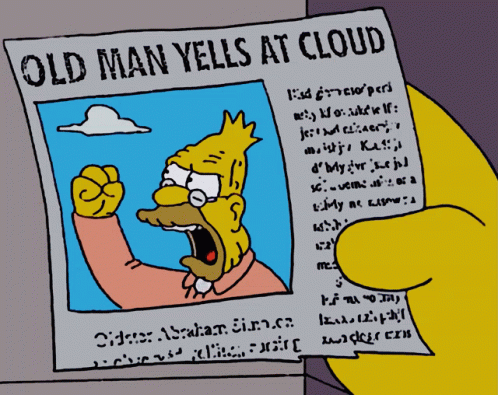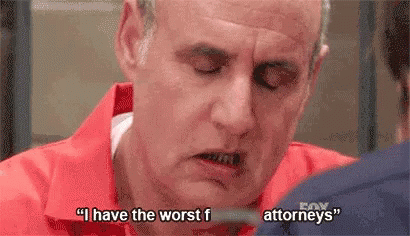No but it can be understood by reference to the Simpsons

No but it can be understood by reference to the Simpsons

I didn’t read the whole thing, but much of it is fantasy. Call it Tolkien inspired.
I haven’t read the whole suit but from what I can tell it lacks LotR’s internal logic.
I hope he has a good attorney. What am I saying? Trump always gets the best attorneys!

Stranger
If Trump uses antics like this and wins the next election ![]() , can he pardon himself?
, can he pardon himself?
It’s a grift which will expand once the motion to dismiss is granted.
Can’t we please let it go to discovery first? You can make it my birthday and Christmas present!
Yeah, I had to check the date - nope, April 1 still hasn’t happened yet.
I didn’t finish reading it yesterday but I will say that while the charges against Fusion GPS, Lisa Page, etc. don’t present enough evidence to be liable to convince a judge that there’s a real case, it is likely that a judge will agree to let the go forward against Rodney Joffe and his people.
This is not purely a work of fiction. Joffe used his position as a private contractor to spy on someone and a Federal prosecutor has officially described his activities as being purposefully fraudulent. (Whether Durham was quoting fulsomely and with a reasonable understanding of what he had read be as it may, it is what he wrote.)
I don’t know that they’ll get much past discovery but I do expect at least that one case to get some traction.
John Durham’s fairy tales about uncharged behavior are not likely to withstand scrutiny.
In terms of the charge that Joffe was trying to falsify information (e.g. to defame Trump), it’s unlikely that it will withstand scrutiny, based on what we know about the contents of the emails that Durham minimally quoted from.
In terms of Joffe using his access to private information without authorization, that does (currently) seem to be an actual violation of privacy and a harmful act. I haven’t seen any defense of it, and I don’t expect one to come out. Trump has a legitimate case on that one, specific element.
That said, discovery is likely to reveal that Team Joffe had a reasonable concern, among the data that they found. Joffe’s team will likely push to get that information out there more strongly and even more in the record than before. And not doing that - keeping quiet and not raising the question of Trump’s activities more publicly again - is likely going to be the offer that they extend to the Trump legal team.
After discovery, I expect that the two parties will quietly agree to both drop the case. Trump could win on the merits, but it won’t be worth it to him compared to the damage that it could do to his brand.
I’m not clear on what you’re saying.
I think it’s pretty clear by now that however reasonable Joffe’s suspicions may have been, that in the end they turned out to be unfounded, and the data he looked at was not in fact capturing any secret communications between Trump people and shady Russian characters. So what exactly is it that might come out in discovery which would damage Trump’s brand?
As I see it, Joffe’s main defense - if it ever comes to that - is that the data did in fact show suspicious activity that needed to be looked at more closely. Let’s grant that this is the case. The question is if Durham comes up with evidence, as he claims to have done, that Joffe’s main motivation in looking to begin with was motivated by partisan political considerations. Is the fact that Joffe came up with up with reasonable grounds for suspicion enough to get him off the hook for his initial data search motivations? I tend to doubt it, but am not any sort of expert.
This. The FBI determined that the data didn’t mean anything but that doesn’t mean that Joffe wouldn’t happily relitigate the question, loudly and publicly, forcing Team Trump to talk about it every day in the news.
If you had to show up on the national news every day for a year, defending yourself against what credibly appeared to tie you to pedophiles then, whether that evidence ultimately proved you innocent to the majority of the public in the end run or not, you’re still not going to be as happy a man as if the subject had simply never been litigated in public at all.
If a private investigator asked a hotel clerk whether a customer in the hotel was a drug dealer, I do not believe that the courts would decide that the clerk had the right to sneak into the room and rifle through the customers bags. I’m not sure which laws forbid a private individual from improper search and seizure, but I’m fairly sure that this isn’t an area like the first amendment where it only applies to the government and not to the lay citizen.
If, among their regular duties, the clerk visited the room and could plainly observe something suspicious looking then telling the PI what they say might be a “fair use” exception. But the only way to go from there to peaking into the customer’s private belongings is to take it to the police and hope that they will execute a search warrant.
While Joffe’s work was handed over to the police, the emails prove that they were actively investigating and snooping. It wasn’t the networking equivalent of, “Hey did you notice anything suspicious during your regular work?” It was a direct order to dive into private data and snoop around.
I don’t see it.
Trump is way past that point. This has already been discussed and investigated in tremendous detail, and the reason the suspicions were unfounded are well known. At this point, talking about it helps Trump’s brand, IMHO.
The crucial difference is that a hotel clerk’s job does not involve snooping around for suspicious-looking things. But Joffe’s job included (per his claim, which let’s accept for this purpose) reporting anything suspicious that he came across. So if he was randomly looking at the data for suspicious patterns and came across Trump and then dug in further, he would be fine. The issue here is that his initial look at Trump was (apparently) based on a desire to get the goods on Trump. That’s the core question.
I hadn’t seen that defense but it is certainly a better one.
If a hotel had an inspector on the premises and customers were informed and agreed that they might have their belongings examined by him, that gets past one major element.
Likewise, since it’s his job to investigate such matters, any report that came in to him would be reasonable for him to act upon - regardless of the source.
But he wouldn’t be allowed to give the answer back to the person who reported the issue. It would either go to his superiors or currently from him to the police.
If he’s using the results of his confidential work product for his personal gain, that’s fraud (not fraud in the sense of “deceit” but fraud in the sense of “criminal use of information”. Insider trading is a crime of “fraud”.)
Joffe’s spokesperson said that under the terms of his contract, “the data could be accessed to identify and analyze any security breaches or threats.”
“As a result of the hacks of EOP and [Democratic National Committee] servers in 2015 and 2016, respectively, there were serious and legitimate national security concerns about Russian attempts to infiltrate the 2016 election,” the spokesperson said. “Upon identifying DNS queries from Russian-made Yota phones in proximity to the Trump campaign and the EOP, respected cyber-security researchers were deeply concerned about the anomalies they found in the data and prepared a report of their findings, which was subsequently shared with the CIA.”
In this case he didn’t have a report. His job was to come up with the report. It’s as if someone came to him and said “see if you can get anything on so-and-so”, so he went looking through that guy’s stuff and came up with some suspicious material.
So Trump says that Hilary’s people hacked into the Obama White House to get intel on Trump in 2016? That is truly bizarre.
This is the guy who contested the validity of an election that everyone agreed that he legally won, and then started a futile insurrection for an election that by all available evidence he soundly lost. Bizarre is on-brand for Trump.
Stranger
Their story is not super internally consistent. One thing that’s clear is that Joffe was paying Perkins Coie, not the other way around. That fact kind of blows up the idea that the Clinton campaign paid these security researchers to fabricate dirt on Trump. The flow of money is in the wrong direction.
The dude needs a different hobby.